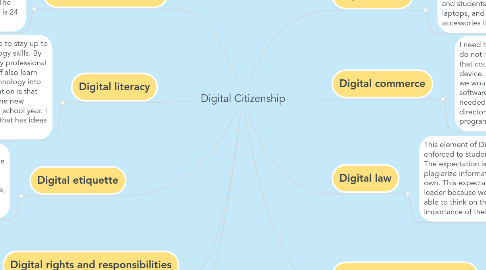Digital Citizenship
by Mollie Moran

1. Digital communication
1.1. The expectation for digital communication for students, parents, and staff will be formatted in a professional manner. In return, the students will respond to teachers in a professional way, too. The time turn around for communication is 24 hours.
2. Digital literacy
2.1. As a building leader, I have to stay up to date on the latest technology skills. By offering various technology professional development will help staff also learn new ways to integrate technology into the classroom. My expectation is that everyone will try at least one new platform for the upcoming school year. I will provide a google doc that has ideas of what they can use.
3. Digital etiquette
3.1. My modeling proper etiquette on school social media, teachers who choose to have a class Twitter or Instagram will know how to act appropriately online as well. These platforms are used to boost school morale, and highlight the achievements of the building.
4. Digital rights and responsibilities
4.1. The school's acceptable use policy outlines the rights and responsibilities students at Holy Name have to uphold. Students should also use proper etiquette on their personal accounts.
5. Digital security
5.1. It is important to keep passwords and access to teacher laptops secure. I would ask staff to keep their laptops logged off when they are not in their room, and their passwords to sites not visible on their desks.This keeps everyone information secure, and cannot be accessed by students, or other staff members.
6. Digital access
6.1. As a principal, I have to ensure that each student and teacher has access to technology inside the school building.This means providing teachers and students with enough access to Wifi, laptops, and other technology accessories they need to be successful.
7. Digital commerce
7.1. I need to ensure that students and teachers do not have access to download materials that could potentially cause harm to their device. By working with the IT department, we would set up restrictions on downloading software directly onto laptops. If someone needed a program downloaded, the IT director would be in charge of approving the program.
8. Digital law
8.1. This element of Digital Citizenship is enforced to students inside the classroom. The expectation is that students do not plagiarize information and take it as their own. This expectation is important to as a leader because we want our students to be able to think on their own, and realize the importance of their own thoughts.
9. Digital health and wellness
9.1. It is important for administration, and teachers to mentally log off after each school day. I will advocate that staff, including myself, avoid responding to emails and requests after they have left the school building for the day. This will be made clear to parents and students that teachers have 24 hours to respond to emails, and that might mean the following day if the email was sent after school hours.


